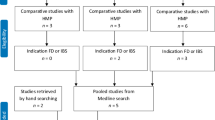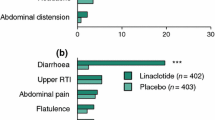Abstract
Acotiamide (Acofide®), an oral first-in-class prokinetic drug, is under global development by Zeria Pharmaceutical Co. Ltd and Astellas Pharma Inc. for the treatment of patients with functional dyspepsia. The drug modulates upper gastrointestinal motility to alleviate abdominal symptoms resulting from hypomotility and delayed gastric emptying. It exerts its activity in the stomach via muscarinic receptor inhibition, resulting in enhanced acetylcholine release and inhibition of acetylcholinesterase activity. Unlike other prokinetic drugs that are utilized in the management of functional dyspepsia, acotiamide shows little/no affinity for serotonin or dopamine D2 receptors. Acotiamide is the world’s first approved treatment for functional dyspepsia diagnosed by Rome III criteria, with its first approval occurring in Japan. Phase III trials in this patient population are in preparation in Europe, with phase II trials completed in the USA and Europe. This article summarizes the milestones in the development of acotiamide, leading to its first approval for use in patients with functional dyspepsia.
Similar content being viewed by others
References
Tack J, Talley NJ. Functional dyspepsia—symptoms, definitions and validity of the Rome III criteria. Nat Rev Gastroenterol Hepatol. 2013;10(3):134–41.
Camilleri M, Stanghellini V. Current management strategies and emerging treatments for functional dyspepsia. Nat Rev Gastroenterol Hepatol. 2013;10(3):187–94.
Karamanolis GP, Tack J. Current management of functional dyspepsia: impact of Rome III subdivision. Ann Gastroenterol. 2012;25(2):96–9.
Lacy BE, Talley NJ, Locke GR 3rd, et al. Review article: current treatment options and management of functional dyspepsia. Aliment Pharmacol Ther. 2012;36(1):3–15.
Suzuki H, Hibi T. Acotiamide (Z-338) as a possible candidate for the treatment of functional dyspepsia. Neurogastroenterol Motil. 2010;22(6):595–9.
Matsunaga Y, Tanaka T, Yoshinaga K, et al. Acotiamide hydrochloride (Z-338), a new selective acetylcholinesterase inhibitor, enhances gastric motility without prolonging QT interval in dogs: comparison with cisapride, itopride, and mosapride. J Pharmacol Exp Ther. 2011;336(3):791–800.
Astellas P. Conclusion of co-development and co-marketing agreement on a functional dyspepsia agent Z-338/YM443 in Japan with Zeria. 2008. http://www.astellas.com. Accessed 20 Jun 2013.
Zeria Pharmaceutical Co. Ltd, Astellas Pharma Inc. Approval in Japan for treating functional dyspepsia with Acofide®. 2013. http://www.astellas.com. Accessed 20 Jun 2013.
Zeria Pharmaceutical Co. Ltd, Astellas Pharma Inc. Launch of Acofide® in Japan for treating functional dyspepsia. 2013. http://www.astellas.com. Accessed 20 Jun 2013.
Zeria Pharmaceutical Co. Ltd. Responding to cutting-edge medical demands. 2013. http://www.zeria.co.jp/english/comp/co_0501.html. Accessed 24 Jun 2013.
Zeria Pharmaceutical Co. Ltd, Astellas Pharma Inc. Acofide® tablets 100 mg: Japanese prescribing information. 2013. http://www.zeria.co.jp/medi/data/acofide01/pdf/tenpu_201306.pdf. Accessed 18 Jun 2013.
Matsueda K, Hongo M, Tack J, et al. Clinical trial: dose-dependent therapeutic efficacy of acotiamide hydrochloride (Z-338) in patients with functional dyspepsia—100 mg t.i.d. is an optimal dosage. Neurogastroenterol Motil. 2010;22(6):618–25, e173.
Tack JF, Stanghellini V, Holtmann G, et al. Efficacy and safety study of acotiamide (Z-338) in European patients with functional dyspepsia [abstract no. Tu1359]. Gastroenterology. 2011;140(5 Suppl.1):S805.
Zeria Pharmaceutical Co. Ltd. To evaluate the efficacy and safety of acotiamide in subjects with functional dyspepsia [ClinicalTrials.gov identifier NCT00323817]. US National Institues of Health, ClinicalTrials.gov. 2011. http://www.clinicaltrials.gov. Accessed 14 Jun 2013.
Astellas Pharma Inc. A phase 2b, multicenter, randomized, double-blind, placebo-controlled, parallel group, dose ranging study of YM443 [Z 338, acotiamide] in subjects with functional dyspepsia [ClinicalTrials.gov identifier NCT00102310]. US National Institutes of Health, ClinicalTrials.gov. 2008. http://www.clinicaltrials.gov. Accessed 12 Jun 2013.
Talley NJ, et al. A novel acetylcholine esterase inhibitor acotiamide hydrochloride (YM443) in functional dyspepsia: efficacy in a randomized, double-blind, placebo-controlled dose ranging trial [abstract no. 1053]. Gastroenterology. 2008;134(4 Suppl.1):A157–8.
Matsueda K, Hongo M, Tack J, et al. A placebo-controlled trial of acotiamide for meal-related symptoms of functional dyspepsia. Gut. 2012;61(6):821–8.
Matsueda K, Hongo M, Ushijima S, et al. A long-term study of acotiamide in patients with functional dyspepsia: results from an open-label phase III trial in Japan on efficacy, safety and pattern of administration. Digestion. 2011;84(4):261–8.
Zeria Pharmaceutical Co. Ltd, Yamanouchi Pharmaceutical Co. Ltd. Zeria and Yamanouchi sign letter of intent for development and marketing of the gastroprokinetic Z-338. 2002. http://www.yamanouchi.com. Accessed 20 Jun 2013.
Zeria Pharmaceuticals Co. Ltd, Astellas Pharma Inc. Launch of Acofide® in Japan for treating functional dyspepsia. 2013. http://www.astellas.com/en/corporate/news/detail/launch-of-acofide-in-japan-for.html. Accessed 5 Jul 2013.
Yoshii K, Hirayama M, Nakamura T, et al. Mechanism for distribution of acotiamide, a novel gastroprokinetic agent for the treatment of functional dyspepsia, in rat stomach. J Pharm Sci. 2011;100(11):4965–73.
Doi Y, Murasaki O, Kaibara M, et al. Characterization of functional effects of Z-338, a novel gastroprokinetic agent, on the muscarinic M1, M2, and M3 receptors expressed in Xenopus oocytes. Eur J Pharmacol. 2004;505(1–3):31–5.
Nagahama K, Matsunaga Y, Kawachi M, et al. Acotiamide, a new orally active acetylcholinesterase inhibitor, stimulates gastrointestinal motor activity in conscious dogs. Neurogastroenterol Motil. 2012;24(6):566–74, e256.
Kanemoto Y, Ishibashi H, Doi A, et al. An electrophysiological study of muscarinic and nicotinic receptors of rat paratracheal ganglion neurons and their inhibition by Z-338. Br J Pharmacol. 2002;135(6):1403–14.
Nakajima T, Nawata H, Ito Y. Z-338, a newly synthetized carboxyamide derivative, stimulates gastric motility through enhancing the excitatory neurotransmission. J Smooth Muscle Res. 2000;36(2):69–81.
Kawachi M, Matsunaga Y, Tanaka T, et al. Acotiamide hydrochloride (Z-338) enhances gastric motility and emptying by inhibiting acetylcholinesterase activity in rats. Eur J Pharmacol. 2011;666(1–3):218–25.
Ogishima M, Kaibara M, Ueki S, et al. Z-338 facilitates acetylcholine release from enteric neurons due to blockade of muscarinic autoreceptors in guinea pig stomach. J Pharmacol Exp Ther. 2000;294(1):33–7.
Morita H, Abe K, Ito Y, et al. Possible involvement of M5 muscarinic receptor in the enhancing actions of the novel gastroprokinetic agent Z-338 on nifedipine-sensitive voltage-dependent Ca2+ currents in guinea pig stomach. Jpn J Pharmacol. 2002;89(4):356–65.
Akaike H, Jang II-S, Hori N, et al. Effects of Z-338, a novel gastroprokinetic agent, on the actions of excitatory and inhibitory neurotransmitters on neurons in area postrema. J Smooth Muscle Res. 2010;46(1):31–47.
Seto K, Sasaki T, Katsunuma K, et al. Acotiamide hydrochloride (Z-338), a novel prokinetic agent, restores delayed gastric emptying and feeding inhibition induced by restraint stress in rats. Neurogastroenterol Motil. 2008;20(9):1051–9.
Tack J, Masclee A, Heading R, et al. A dose-ranging, placebo-controlled, pilot trial of acotiamide in patients with functional dyspepsia. Neurogastroenterol Motil. 2009;21(3):272–80.
Kusunoki H, Haruma K, Manabe N, et al. Therapeutic efficacy of acotiamide in patients with functional dyspepsia based on enhanced postprandial gastric accommodation and emptying: randomized controlled study evaluation by real-time ultrasonography. Neurogastroenterol Motil. 2012;24(6):540–5, e250–1.
Adam B, Liebregis T, Zschau NB, et al. Z-338 improves meal-induced symptoms in functional dyspepsia; a double-blind, randomized, placebo controlled crossover study [abstract no. T1266]. Gastroenterol. 2009;136(5 Suppl.1):A535.
Zeria Pharmaceutical Co. Ltd. The effects of Z-338 in subjects with and without functional dyspepsia [ClinicalTrials.gov identifier NCT00298194]. US National Institues of Health, ClinicalTrials.gov. 2009. http://www.clinicaltrials.gov. Accessed 25 Jun 2013.
Astellas Pharma Inc. A phase I, randomized, double-blind, placebo- and active-controlled, crossover study to evaluate the effect of repeat oral doses of YM443 on cardiac repolarization in healthy male and female adult subjects [ClinicalTrials.gov identifier NCT00850746] US National Institutes of Health, ClinicalTrials.gov. 2010. http://www.clinicaltrials.gov. Accessed 18 Jun 2013.
Oliver SD, Ward C, Ward J, et al. Z-338: phase I, single and multiple oral dose, safety, tolerability and pharmacokinetic studies in healthy male subjects [abstract no. 948 plus poster]. In: 7th world conference on clinical pharmacology and therapeutics (CPT) and the 4th congress of the European Association for Clinical Pharmacology and Therapeutics (EACPT), 16–20 July 2000, Florence.
Furuta S, Kamada E, Omata T, et al. Drug-drug interactions of Z-338, a novel gastroprokinetic agent, with terfenadine, comparison with cisapride, and involvement of UGT1A9 and 1A8 in the human metabolism of Z-338. Eur J Pharmacol. 2004;497(2):223–31.
Matsueda K, Hongo M, Tack JF, et al. Efficacy of acotiamide (Z-338) in patients with postprandial distress syndrome or overlap of epigastric pain syndrome and postprandial distress syndrome in functional dyspepsia [abstract no. Tu1357]. Gastroenterology. 2011;140(5 Suppl. 1):S805.
Author information
Authors and Affiliations
Corresponding author
Additional information
This profile has been extracted and modified from the Adis R&D Insight drug pipeline database. Adis R&D Insight tracks drug development worldwide through the entire development process, from discovery, through pre-clinical and clinical studies to market launch.
Rights and permissions
About this article
Cite this article
Nolan, M.L., Scott, L.J. Acotiamide: First Global Approval. Drugs 73, 1377–1383 (2013). https://doi.org/10.1007/s40265-013-0100-9
Published:
Issue Date:
DOI: https://doi.org/10.1007/s40265-013-0100-9




